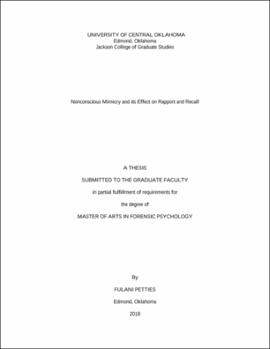| dc.contributor.advisor | Mather, Robert | |
| dc.contributor.author | Petties, Fulani | |
| dc.date.accessioned | 2020-07-09T14:41:48Z | |
| dc.date.available | 2020-07-09T14:41:48Z | |
| dc.date.issued | 2018 | |
| dc.identifier.other | (AlmaMMSId)9982642984502196 | |
| dc.identifier.uri | https://hdl.handle.net/11244/325150 | |
| dc.description.abstract | Nonconscious mimicry is used to build rapport as well gain the liking of others, during first encounters and when there is a perceived threat to belonging or existing relationships. Mimicry can occur through verbal and nonverbal methods such as physical gestures, mannerisms and taking on the perception of others. This experiment explored whether the absence or presence of behavioral mimicry affects rapport and recall measured by the accuracy of details. It was hypothesized that behavioral mimicry would result in more accurate recall of details. The hypothesis of the study was not confirmed. | |
| dc.rights | All rights reserved by the author, who has granted UCO Chambers Library the non-exclusive right to share this material in its online repositories. Contact UCO Chambers Library's Digital Initiatives Working Group at diwg@uco.edu for the permission policy on the use, reproduction or distribution of this material. | |
| dc.subject.lcsh | Imitation | |
| dc.subject.lcsh | Recollection (Psychology) | |
| dc.subject.lcsh | Affiliation (Psychology) | |
| dc.title | Nonconscious mimicry and its effect on rapport and recall. | |
| dc.type | Academic theses | |
| dc.contributor.committeeMember | Limke-McLean | |
| dc.contributor.committeeMember | Mabry, John | |
| dc.thesis.degree | M.A., Forensic Psychology | |
| dc.subject.keywords | Affiliation | |
| dc.subject.keywords | Chameleon effect | |
| dc.subject.keywords | Imitation | |
| dc.subject.keywords | Nonconscious mimicry | |
| dc.subject.keywords | Rapport | |
| dc.identifier.oclc | (OCoLC)1100112320 | |
| uco.group | UCO - Graduate Works and Theses::UCO - Theses | |
| thesis.degree.grantor | Jackson College of Graduate Studies. | |
